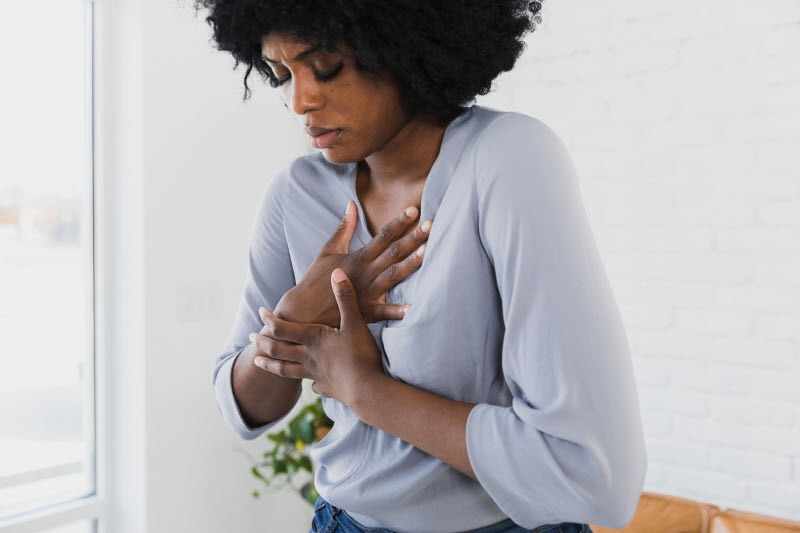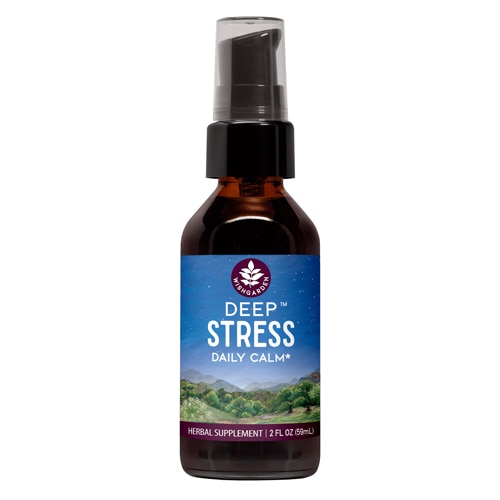[vc_row][vc_column][vc_column_text]Dizziness. Chest pain. Heart palpitations. A bizarre, out-of-body sense of detachment. Monumental fear. For an estimated 11 percent of the population, these symptoms may indicate the onset of
a panic attack—an episode that can last between a few minutes and a few hours but
feel like a lifetime.

If you’ve ever experienced a panic attack, you know that they can be intense and terrifying. Whether one struck moments after you received devastating news or prior to public speaking—or maybe just driving through an unfamiliar area—the memory of it likely provokes even more unease in what experts define as “anticipatory anxiety.” You may also know that a panic attack can feel like you’re on the verge of death and cause you to question, “Am I having a panic attack—or is something else wrong with me?”
While only your healthcare practitioner can make that distinction, below you’ll find six underlying issues that may mimic a panic attack—and, if one in fact strikes, how to manage its symptoms naturally.
But first: What are the signs of a panic attack?
A panic attack is defined as a constellation of physical symptoms that may hit during incidents of immense anxiety or fear. Separate from an anxiety attack, which isn’t medically defined (and is instead deemed a sign of Generalized Anxiety Disorder), panic attacks arrive with a host of unsettling symptoms, such as:
- Trembling
- Shaking
- Tense muscles
- A dream-like state and detachment from reality
- Hot flashes or chills
- Numbness or tingling in the hands, feet, arms, and/or legs
- Chest pain
- Nausea
- Feeling like you’re choking
- Accelerated pulse
- Irrational, anxious thinking (such as impending doom)
- Difficulty breathing
- Lightheadedness
- An overwhelming fear that you’re losing control or dying
As these symptoms suggest, a panic attack can be downright
debilitating, especially if there’s no obvious trigger in sight. And while some people may go on to receive a diagnosis of a panic disorder—a mental health condition that’s characterized by repeated, unexpected attacks of sudden, profound terror—others may have isolated episodes that can be just as confounding. Mainly, it may propel them to ask if something
more may be amiss with their health.
6 health conditions that may imitate a panic attack
The symptoms of a panic attack may overlap with:
1. Cardiovascular conditions
Suddenly pummeled with constriction in your chest and a profuse sense of unreality? It’s perfectly understandable to
believe you’re having a heart attack, particularly when your thoughts are spinning a mile a minute and your pulse is echoing between your years.
Heart attacks share many of the primary symptoms of a panic attack but may also be accompanied by:
- Pain that extends to your shoulders, arms, back, jaw, neck, or upper torso
- Indigestion or heartburn
- Chest pain that feels like squeezing, aching, or pressure
- Fatigue
If you don’t have a history of panic attacks but
have experienced signs of cardiovascular issues, such as recurring chest pain, call 911 immediately. It very well could be panic, but, when it comes to your health, it’s always best to err on the side of caution.
2. Diabetes
Diabetes might be the last thing you think of when you’re hit with inordinate anxiety, but uncontrolled diabetes can cause blood sugar levels to both spike and plummet—and result in a quickened heart rate, trembling, and sweating. And yet, unlike a panic attack, undiagnosed diabetes may also go hand-in-hand with frequent urination, unintentional weight loss, extreme thirst, and blurry vision.
3. Perimenopause
Perimenopause, or the stretch of years that precede the complete cessation of menstruation, may provoke unprecedented anxiety in a woman’s life. Due to wild fluctuations in estrogen levels, you might experience everything from acute nervousness to the idea that you’re “going crazy” to, yes, a handful of the symptoms a classic panic attack calls forth. This may be especially true in the moments leading up to a hot flash.
4. Hyperthyroidism
Speaking of hormonal imbalances: Hyperthyroidism, or a condition in which you generate an abundance of thyroid hormones, may arouse sensations that ape a panic attack, namely:
- Spinning thoughts
- Nervousness and anxiety
- Fast heart rate
What’s more, hyperthyroidism ramps up your metabolism and can make you feel like your whole body is revving—prime breeding ground for thinking you’re having a panic attack of epic proportions.
5. Adrenal conditions
Sitting just above your kidneys rest two, triangular-shaped glands that may be small in size but have a
huge impact on your stress response, hormone function, mood, immunity, blood pressure, and metabolism—in sum, your overall
wellness. Known as your adrenals, they also have a unique relationship with fear by both causing panic and anxiety and, when depleted, exacerbating both grand and quotidian life stressors.
A number of thyroid conditions may trigger several symptoms associated with a panic attack—such as the dizziness commonly linked to Addison’s disease and the faintness felt in those with adrenal
fatigue—but one particular adrenal condition may cause actual panic attacks:
Pheochromocytoma. While rare, the condition, which is defined by the presence of non-cancerous tumors in the adrenal glands, may also spark off heart palpitations, shortness of breath, high blood pressure, and general angst.
6. Asthma
Asthma and panic attacks have an extraordinary relationship as well: Both may bring on lightheadedness, trouble breathing, and chest aches. Both can also be precipitated by palpable triggers, such as a conflict in your romantic relationship or financial troubles. And yet, what distinguishes a panic attack from an
asthma attack is that the latter is usually marked by pronounced coughing and wheezing.
Should any of these additional symptoms present, it’s imperative to schedule an appointment with your primary care physician or naturopathic doctor, who can determine if an underlying medical condition is masquerading as panic. But if you
are indeed falling victim to a panic attack? Read on.
How to halt a panic attack in its tracks
It’s tremendously difficult to think straight when your internal alarm bells have been sounded and you feel a rush of pure, startling adrenaline. You might have the urge to flee your surroundings. Or perhaps you may feel like they’re on the brink of passing out. Quite possibly, you experience the need to do something and something fast, whether that’s calling for emergency medical help or gripping the side of the table to feel “tethered” to the physical world.
First things first: Remember that you
will survive a panic attack, even if it might feel wholly paralyzing and horribly uncomfortable (and possibly leave you exhausted and shaken). To mitigate its effects in the moment, and before and after, consider:
Acknowledging your symptoms
You may want to do something,
anything, to make yourself feel better as fast as possible. Yet, pausing to recognize and accept the physiology of panic can help you assume a modicum of control over the situation before you do something unreasonable or even potentially dangerous. As you identify the sensations that arise, you can remind yourself that, while unpleasant, they’re a completely natural part of the panic process.
Grounding yourself
That powerful feeling of depersonalization that arrives with some panic attacks can be one of its most disturbing symptoms. To return to your body, aim to
ground yourself in your immediate surroundings. This may involve slipping off your shoes to feel the earth underneath your feet, or placing one hand on your belly and the other hand on your heart to feel, and moderate your breathing.
Another surefire way to come back to the present? Encourage yourself to home in on three objects in your vicinity, three sounds you can hear, and three scents you can smell. The intentionality behind this exercise may not only help you reconnect your mind and body, but it may also slow down your breathing and heart rate.
Avoiding negative self-talk
Telling yourself that you’re “being absurd” or to “just relax” may work against you—and
perpetuate the panic attack. But using compassionate and realistic language in
self-talk, such as “there is no genuine threat,” “you’re safe,” and even “I love you” may give you the dose of empathy and logic you need to move through the incident faster.
Breathing in fresh air
Unless you’re on a train, airplane, or subway, shoot to get fresh air immediately, whether by rolling down the window in your car, opening a window in your home or office, or stepping outside. Closing your eyes to mindfully absorb the sensation of air on your skin may allay some of your agitation.
…or an essential oil
True: You may not carry a vial of essential oil with you at all times, but if you’re prone to panic and anxiety attacks (or just anxiety, period) you may want to invest in a rollerball to keep in your car, handbag, or briefcase.
Lavender is famous for its soothing effects on the nervous system, while bergamot, vetiver, and frankincense may do wonders in restoring your calm, clarity, and balance.
Identifying your triggers—and exercise smart stress-busting strategies
As discussed, panic attacks can strike for no apparent reason, but they usually appear after or during an accumulation of stressors, both physical and environmental. This may be acute, traumatic stress due to a divorce, career change, or cross-country move, or chronic stress caused by economic insecurity or an ill child. For others, it may mean over-imbibing on caffeine or alcohol; the latter can cause withdrawals that provoke panic and anxiety. And for others still, it may be environmental pressures, such as living in a hostile household or working in a high-demand profession.
Seeing what may be contributing to your anxiety will enable you to make necessary, positive changes. And if you have
persistent panic attacks? By all means, speak with a professional, who can help you create peace and equilibrium through cognitive behavioral therapy (CBT),
somatic therapy or biofeedback.
Lastly, consistently practice the five pillars of sound health to cultivate a resilient nervous system: Balanced nutrition, quality sleep, ample exercise, sufficient hydration, and strong social connections. Because when panic floods you, sometimes the kindest and most expedient way to manage it is reaching out to someone you love.~[/vc_column_text][/vc_column][/vc_row][vc_row][vc_column][vc_text_separator title="Featured Products" border_width="2"][vc_row_inner equal_height="yes" content_placement="middle" gap="35"][vc_column_inner width="1/3"][vc_single_image image="174687" img_size="full" alignment="center" onclick="custom_link" img_link_target="_blank" css=".vc_custom_1714226403185{padding-right: 7% !important;padding-left: 7% !important;}" link="https://www.vitacost.com/natures-way-quick-calm-gummy"][/vc_column_inner][vc_column_inner width="1/3"][vc_single_image image="174688" img_size="full" alignment="center" onclick="custom_link" img_link_target="_blank" css=".vc_custom_1714226420408{padding-right: 7% !important;padding-left: 7% !important;}" link="https://www.vitacost.com/terry-naturally-anxiocalm"][/vc_column_inner][vc_column_inner width="1/3"][vc_single_image image="174689" img_size="full" alignment="center" onclick="custom_link" img_link_target="_blank" css=".vc_custom_1714226444584{padding-right: 7% !important;padding-left: 7% !important;}" link="https://www.vitacost.com/gaia-herbs-dailywellness-stress-response-30-vegetarian-liquid-phyto-caps"][/vc_column_inner][/vc_row_inner][/vc_column][/vc_row]
 If you’ve ever experienced a panic attack, you know that they can be intense and terrifying. Whether one struck moments after you received devastating news or prior to public speaking—or maybe just driving through an unfamiliar area—the memory of it likely provokes even more unease in what experts define as “anticipatory anxiety.” You may also know that a panic attack can feel like you’re on the verge of death and cause you to question, “Am I having a panic attack—or is something else wrong with me?”
While only your healthcare practitioner can make that distinction, below you’ll find six underlying issues that may mimic a panic attack—and, if one in fact strikes, how to manage its symptoms naturally.
If you’ve ever experienced a panic attack, you know that they can be intense and terrifying. Whether one struck moments after you received devastating news or prior to public speaking—or maybe just driving through an unfamiliar area—the memory of it likely provokes even more unease in what experts define as “anticipatory anxiety.” You may also know that a panic attack can feel like you’re on the verge of death and cause you to question, “Am I having a panic attack—or is something else wrong with me?”
While only your healthcare practitioner can make that distinction, below you’ll find six underlying issues that may mimic a panic attack—and, if one in fact strikes, how to manage its symptoms naturally.



